Nicole Helget: The Turtle Catcher
September 15, 2010 by David
Filed under Fiction, WritersCast
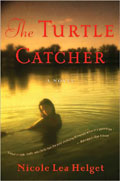 978-0547248004 – Mariner Books – paperback – $13.95 (also available as an e-book)
978-0547248004 – Mariner Books – paperback – $13.95 (also available as an e-book)
I found this book, written by an author I had never heard of before, by doing something very old fashioned: browsing in a bookstore. There are many forms of discovery, but finding a book you want to read in a store is still a great pleasure. And when you take it home and start reading it, and find out you made a lucky choice to read an exceptionally fine novel, that is a true and deeply rewarding experience.
I was surprised to learn that The Turtle Catcher is Nicole Helget’s first novel – she doesn’t write like a first novelist at all. The opening of this novel is absolutely perfect, and is beautifully written, setting the tone for a complicated, very often painful, but also engrossing story. Helget’s novel is mystical and magical, but these moments of “magical realism” where she enters another plane counterpoint brilliantly with the almost plainspoken story she has to tell about immigrant families in a German-American community in rural Minnesota in the early 20th century. The book is set in the now little discussed period just before, during and after World War I, a time that was very complicated for communities of recently arrived immigrants from the old country, with Germany now the enemy of their new homeland. The tensions within the town provide a taut backdrop for Helget’s for the focus of her story.
The author weaves together the lives of two families living on adjoining farms in the small town of New Germany, Minnesota. Liesel Richter and Lester Sutter are at the core of the book, along with their fathers and deeply suffering mothers, and what happens to Lester, told brilliantly and painfully in the opening scene of the book is the capstone to a long, rich story of families and communities, hidden wounds and deep suffering transformed into a kind of stoic transcendence Helget’s characters embrace, almost because it is all they are capable of doing in the face of such pain.
In The Turtle Catcher, Nicole Helget has created a multi-layered family story whose characters inhabit (and illustrate for readers) a specific place and time, but as with all great novels, through their story, they are transformed into something deeply moving and powerful. I really loved this novel, and will read it again, I am sure.
I wanted to talk to Nicole about the emotional content of the book, how she came to create this novel (it started with a short story), and discuss some of the complexities of her really wonderfully drawn characters. I think we succeeded in exploring this writer’s work in a really interesting conversation I hope will encourage readers to seek this novel out and read it for themselves. I do think Nicole Helget is a terrific writer, someone whose work I am deeply gratified to have discovered.
Podcast: Play in new window | Download
Avery Aames: The Long Quiche Goodbye
September 5, 2010 by David
Filed under Fiction, WritersCast
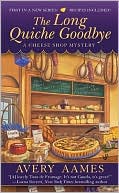 978-0425235522 – Berkley – Mass Market Paperback Original – $7.99 (also available as an ebook 978-1101188644 at $6.99)
978-0425235522 – Berkley – Mass Market Paperback Original – $7.99 (also available as an ebook 978-1101188644 at $6.99)
I don’t often read mysteries, but a few weeks ago, right in the middle of summer, the season for entertaining novels (often known as “beach reads”) I decided to give this novel a try. The tongue-in-cheek title first caught my attention, and I really liked the unusual setting for the novel (small town Ohio) and the quirky but very believable cast of characters. So The Long Quiche Goodbye is definitely a fun read but not just a throwaway summer book. Avery Aames is a good writer and she has deft with her creation and handling of characters.
As I mentioned, I am not a steady reader of mysteries, so I may not be as experienced as some are with the various forms and formats of mysteries – they do fall into a set of recognizable patterns, I know. In The Long Quiche Goodbye, our main character is Charlotte Bessette, the proprietor of the family owned cheese shop called Fromagerie Bessette, in the small town of Providence, Ohio. At the gala re-opening of the store after a full scale renovation and modernization, the store’s landlord (whom we already know not to like) is found stabbed to death with one of the store’s knives, and Charlotte’s grandmother is the prime suspect.
We’re off from there, with a full cast of local characters, friends, family, police, and a couple of other prime suspects in town to make things interesting. And it’s Charlotte who takes the lead in finding out who the real killer must be, as clearly, she feels (and we come to feel as well) that it could not have been her wonderful grandmother (who is the Mayor of the town!)
Avery Aames had a lot of fun writing The Long Quiche Goodbye, I think, and her pleasure and involvement with her characters comes across in the way she writes their story. I also had a great time talking to her about this well written book, her work as a writer, and the next books in the series that this book inaugurates. It looks like this series will be successful, and deservedly so – this first in the “Cheese Shop Mysteries” is already a national bestselling mystery novel. You can visit Avery’s website to learn more.
Podcast: Play in new window | Download
Kamran Pasha: Shadow of the Swords
August 28, 2010 by David
Filed under Fiction, WritersCast
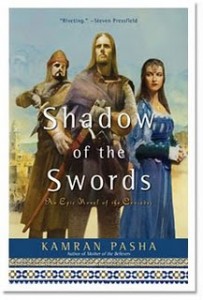 978-1416579953 – Washington Square Press – Paperback Original – $16.00 (e-book edition $9.99)
978-1416579953 – Washington Square Press – Paperback Original – $16.00 (e-book edition $9.99)
I love reading really good historical novels. I’m actually not sure how I found out about this book, but I knew I wanted to read it when I learned that the author, Kamran Pasha, is a Muslim writing about the Third Crusade from a Muslim perspective. That’s definitely a fresh concept. It turns out that Pasha is a terrific writer, and a deft story teller.
It’s almost impossible for Western readers not to think about the Crusades from the Christian side. The Third Crusade, headed by Richard the Lion-Heart, is one of the best known stories ever told, and our knowledge and understanding of the great Muslim ruler Saladin is without doubt cast by the Western version of the story. In Shadow of the Swords, we see things very differently, and not just the Muslim side, there are intriguing Jewish and female characters who are integral to the storyline in many fascinating ways.
Some of the characters and events in this book are based in reality, others are made up, but they are always consistent and believable. By inserting the fictional Miriam, daughter of the historical Maimonides into the story of Richard and Saladin, Pasha is able to link their personae and the real historical events of the battles between them into a much more personal context, which helps bring these complicated characters to life. We realize as the story unfolds that through their opposition, the two main characters will come to know, understand, and appreciate the other, both literally and figuratively. Which is a lesson our modern society could stand to learn too.
Kamran Pasha is a prolific writer. He has created novels (his first book was Mother of the Believers, another historical novel), television (Kings), video games (Blood on the Sand), and is now currently working on a theatrical film as well. He came to writing through an interesting career – he holds a JD from Cornell Law School, an MBA from Dartmouth and an MFA from UCLA Film School. He spent three years as a journalist in New York City before he went to Hollywood to become a full time creative writer.
I really enjoyed reading this book, and talking to Kamran Pasha was a terrific experience I hope you will also enjoy. And do enjoy this serious, well written and very compelling novel. It’s literate, well written and packed with interesting ideas that lives up to its billing as an “epic novel.” Pasha blogs passionately about many current issues at his own website, well worth a visit.
Podcast: Play in new window | Download
Dale Pendell: The Great Bay: Chronicles of the Collapse
August 21, 2010 by David
Filed under Fiction, WritersCast
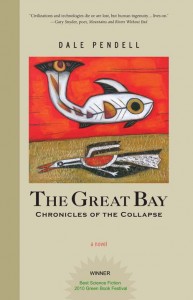 978-1556438950 – North Atlantic Books – Hardcover – $21.95
978-1556438950 – North Atlantic Books – Hardcover – $21.95
This is an amazing novel. Consider it a work of “ecological science fiction” as some have called it. I found it captivating, terrifying, incredibly emotive and reading it becomes almost a spiritual exercise. Pendell posits a worldwide collapse of population from a biological war gone amok. More than 95% of humanity disappears, almost overnight. He actually does not spend much time on this part of the story, horrific as it is, because that catastrophe is really just the lead in for the much bigger story of what happens next.
Aside from the critical principle of understanding, that modern human society will simply collapse, that going back to prior technologies becomes impossible because people no longer have the knowledge or skills, to live the way our ancestors did, and critically, cannot relearn them overnight in the face of societal collapse, the central tenet of this novel is that climate change will have been unleashed by what modern society *has already done* to the natural world. The computer models of planetary climate change are simply not able to fully contain and predict the massiveness of what is about to happen to the planet and the natural world that inhabits it.
The novel is essentially a brilliant imagining of what might or could be the future of the planet over the next hundreds, thousands of years, based on the supposition that humans have already begun this process of change. It’s a rich set of interlocking stories, mostly focused on the area that is known today as California, a bio-geographic landscape that author Pendell knows well, and imagines changing in profound and sometimes painful ways for the reader of his story.
This is a very unusual novel – really the main character is the planet and there are no traditional heroic human characters at its center. While we might search for and find labels for it (“dystopian” or “utopian,” “science fiction” or even “parable”), I’d rather think of it as a kind of vision-telling, a myth in the making, that seeks to change the way we think about ourselves. Indeed, there is a great deal of suffering and difficulty in the book, and at the same time, a powerful sense of continuity, what truly sustains. As the great poet Gary Snyder (who is a fictionalized character in the book, as it happens), says about the novel: “Civilizations and technologies die or are lost, but human ingenuity–families, tribes, and villages, the musicians, shamans, philosophers, and people of power–live on.” I’d add that not only does human ingenuity live on, so does Gaia, our planet home, adjusting and re-adjusting its inner and outer being, regardless of which or how many humans may be hanging on for dear life.
In my conversation with Dale, we talked about his background as a writer, poet, biologist, and how this brilliant vision of a book came into being. It’s an interview and a book I’d recommend to all my friends and colleagues – it’s impossible to read and not do alot of thinking about the future, as well as what we need to do about it – right now.
Podcast: Play in new window | Download
Gayle Brandeis: Delta Girls
August 10, 2010 by David
Filed under Fiction, WritersCast
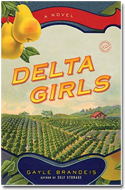 978-0345492623 – Ballantine – Paperback – $15.00 (also available as an e-book at $9.99)
978-0345492623 – Ballantine – Paperback – $15.00 (also available as an e-book at $9.99)
I think I have been lucky lately – I keep finding new novelists I have never heard of before, whose work turns out to be really good. Literary discovery is very exciting. Gayle Brandeis is one of those novelists whose work is completely new to me. Delta Girls is her third novel for adults, and she has one other for young adults. Her social awareness as a writer has been recognized for a previous novel (that I now want to read) called The Book of Dead Birds – it won Barbara Kingsolver’s Bellwether Prize for Fiction in Support of a Literature of Social Change, which I consider high praise indeed. One of Gayle’s great accomplishments in Delta Girls is to include a strong undercurrent of social awareness in a way that enhances the story and does not in any way intrude on one’s enjoyment of the novel and its characters.
Delta Girls is a terrific novel (great cover too, and yes, I do think the overall book package does contribute to the experience for the reader). Its construct is unusual – each chapter is the alternating story of two characters whose relationship is not divulged until nearly the end of the book. First is Izzy, who with her nine year old daughter Quinn, is constantly on the move as an itinerant fruit picker in California. As the story opens, they arrive at a pear orchard in the Sacramento River Delta. As with all her stops, Izzy has no intention of staying very long. But the orchard, its locale, and the family that owns it has a strong attraction for both Izzy and Quinn, and they both allow themselves to become involved and attached to the orchard and its people. We know that Izzy has a secret in her past, and that she has worked hard to stay away from the public eye, but events occur that put her in the middle of developments in the Delta and she will have to risk everything to save the ones she loves.
In the alternating narrative of the book, we meet Karen, a rising young star in figure skating with a pushy mother and a powerful and attractive new skating partner. Nathan is sexy, dangerous, and deeply attractive to Karen. As she reaches her 18th birthday, events come to a head in an unexpected and very public way.
Each main character is faced with a sudden thrust into the spotlight, and of course their narratives become more connected — but you will need to read the book to find out the surprising way their lives will intersect.
This is a very satisfying novel to read, with great characters, and of course the pear orchard and the Delta of the Sacramento River is a terrific backdrop for the book. The author’s deep love for her characters as well as her understanding of the power of place, and its influence on people’s lives show constantly throughout the novel.
Gayle is a thoughtful and accomplished writer whose work I am really pleased to have discovered. It is writing I want to explore more deeply. Talking to her about this book was a pleasure I am happy to share here. You can visit Gayle’s website here to learn more about her work.
Podcast: Play in new window | Download
Justin Kramon: Finny (A Novel)
August 5, 2010 by David
Filed under Fiction, WritersCast
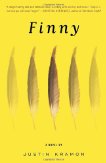 978-0812980233 – Random House – Paperback – $15.00 (also available as an ebook at $9.99 or less)
978-0812980233 – Random House – Paperback – $15.00 (also available as an ebook at $9.99 or less)
Finny is a wonderful first novel, a coming of age novel (and more), at the center of which is a wonderful character – Delphine “Finny” Short of course. This is Justin Kramon’s first novel, and he is a very good writer. He’s been writing and publishing short stories up to now, in literary magazines like Glimmer Train, TriQuarterly and elsewhere, but I think his future lies in the longer form a novel affords.
This novel begins when Finny is 14, and continues on through many more years of her life, with many adventures, and a large cast of really well drawn characters. Many reviewers have mentioned Dickens as a comparative, and that is apt, as Justin himself makes clear that the Dickensian model was on his mind when he was writing this book. He does very well with the large story arc, which gives the author enough room to really explore the inner life of his major characters.
Life is complicated, relationships that seem to have promise fall apart, and sometimes we have to deal with surprises in the way things actually work out. As Finny says herself about life, it is “hilariously funny and devastatingly sad. And only if you saw both things could you ever have a realistic idea of the subject.’’ It’s hard not to agree with the author and his character on this point, especially after spending time with Finny and her life story.
So even though there’s much in Finny’s life that is difficult, sad or disappointing, in both family relationships, love life and friendships, overall, her character comes through as positive about life and how she has lived it, somewhat idiosyncratically, and with a good bit of humor. That’s probably true of the author as well, and it’s a compelling journey for the reader. There’s a lot of richness here, and a thoroughly enjoyable novel it is.
I also enjoyed talking to Justin about his book, its characters, how he came to write this novel, his work as a writer and where he is going in the future. He’s got a really good sense of himself as a writer,an engaging personality, and a fine command of his craft at this early stage of his career. I think there’s much more good work to come from this novelist, work I will certainly be looking forward to reading.
I do also want to mention Justin’s website, which is one of the better author or book sites I have seen lately. There’s alot of fun stuff there, especially fun is the section called “Finny’s World” where the characters in the novel are drawn as imagined by artist David Ostow. It’s definitely worth a visit.
Podcast: Play in new window | Download
Michael Burke: Swan Dive
July 29, 2010 by David
Filed under Fiction, WritersCast
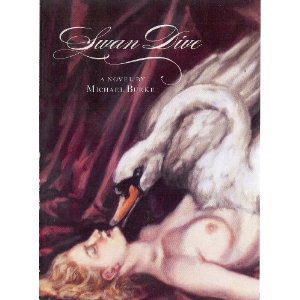 978-1929355501 – Pleasure Boat Studio/Caravel Books – paperback – $15.00 (also available as an e-book at $9.99)
978-1929355501 – Pleasure Boat Studio/Caravel Books – paperback – $15.00 (also available as an e-book at $9.99)
This is Michael Burke’s first novel, and it’s a good one. He is probably much better known as a sculptor and graphic artist; he is clearly an accomplished writer as well, and as with his art, there is a great deal of thought behind the manifestation he has chosen for this story. Michael Burke is also the son of renowned philosopher and poet Kenneth Burke, which may help explain some of his accomplishments.
While I was preparing to interview Michael about his very well written and entertaining novel, I read a fascinating profile of him and his work as an artist in the Harvard Alumni Magazine, an article that in itself is well worth reading.
This is an intellectual novel, but it is never heavy handed. The dialogue is smooth, funny, and vibrant. The story pays homage to Leda and the Swan but that motif never gets in the way of the story, and it’s not even necessary to know any Greek mythology to enjoy the book, which unfolds naturally. Of course we know there is a denouement coming, it’s a murder mystery after all, but there is plenty of complexity to keep us interested and engaged.
Swan Dive‘s main character, Johnny “Blue” Heron, is a modernized Dash Hammett sort of hero, smart, mouthy and alot more in need of help than he realizes. The book has many interesting and engaging characters, an unpredictable narrative, some sex, and an overall verve and political awareness that makes clear the author is socially engaged and has something important to say about the world we live in. You can read this book purely for fun, or as a neo-noir genre revival novel, but there’s alot more going on here for anyone who wants to delve into its many layers.
Swan Dive is a book I will recommend to mystery lovers who want a book with depth, a fast paced narrative and interesting characters. In my discussion with author Michael Burke, we had a lively discussion about this book and how he came to write it, his background as an artist, and where he is headed as a writer (there’s another Blue Heron novel in the works). I’m definitely looking forward to reading more of his writing.
Podcast: Play in new window | Download
Tatjana Soli: The Lotus Eaters: A Novel
June 4, 2010 by David
Filed under Fiction, WritersCast
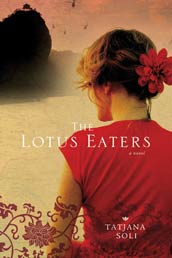 978-0312611576 – St. Martin’s Press – Hardcover – $24.99 (also available as an e-book)
978-0312611576 – St. Martin’s Press – Hardcover – $24.99 (also available as an e-book)
I know I am not alone having read both Tatjana Soli’s The Lotus Eaters and Karl Marlantes’ Matterhorn – they are unavoidably linked as both are set in Vietnam during the American war. Of course they are incredibly different in outlook, approach and story, but reading them together is a wonderful experience. As Writerscast listeners know, I loved Matterhorn – I do think it is the great novel of the Vietnam War that we have been waiting to experience for several decades.
At the same time, Tatjana’s novel is simply remarkable. She writes beautifully, inhabits her characters, their place and time, their suffering, challenges and transcendent moments. As she told me in her interview, she fell in love with the Vietnam of that era from afar, and learned everything she could about it in order to be able to write this story. Her main character is a young photographer, Helen, who comes to Vietnam early in the war, mainly because her brother died there, and she is drawn to the place where he lost his life, to figuratively solve the mystery of his death. But that is just the beginning of her journey. The war, the soldiers and other journalists, and the people of Vietnam overtake her. She becomes deeply connected to this place and time. Soli brilliantly portrays the landscape and the people of Vietnam, the suffering and horror of a seemingly endless war, and the way that war overtakes every element of human and natural life.
Helen falls in love with another photographer, Sam Darrow, a grizzled veteran who teaches her how to cope with war, survive, thrive, document, participate, suffer and love the danger and energy of men at war. But the truest, and deepest story is her love for Linh, an exceptionally complicated Vietnamese former soldier, who has gone to work for the American news agency Helen works for. At the end of the book, which thankfully avoids the cliched approach of much modern fiction, Helen and Linh journey out of Vietnam through Cambodia, an even more horrendous landscape of death and together find their way to safety, a harrowing journey that mirrors where they have traveled emotionally through the course of the novel.
A woman among men sees war more clearly than most, I think; in this book, that vision focuses and transforms the reader as well. Tatjana Soli’s story about writing this book and what it means to her is great to hear. I think she is a terrific writer, worth reading, and well worth listening to as well.
Podcast: Play in new window | Download
Alice Lichtenstein: Lost: A Novel
May 24, 2010 by David
Filed under Fiction, WritersCast
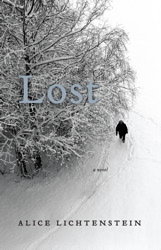 978-1439159828 – Scribner – Hardcover – $24.00 (also available as an e-book)
978-1439159828 – Scribner – Hardcover – $24.00 (also available as an e-book)
Some books are painful but must be read; the suffering of the characters we identify , endured, the story absorbed into one’s bones. I found that to be the case with Lost: A Novel by Alice Lichtenstein. This story operates on a number of levels, as a good novel should. Its three main characters are “lost” but each in different ways. And unlike the television show of the same name (I wonder how that congruency affects the potential readership of this novel?), the core of the story is not hidden away from us, the literal losses in this novel are by far not the deepest pain the characters endure, nor we the readers with them.
But don’t get wrong, this is not a novel so full of pain that it drives you away, or causes you to wonder why you are there. It’s not a book that is simply devoted to misery, and certainly not the kind of suffering that drives us away from the book or its characters. I was immediately drawn into the story, attracted to the characters, especially Susan, whose husband suffers from acute dementia, and has walked away into the winter, and Christopher, whose wife has left him. Their losses and their relationship is at the heart of the novel, and will ultimately unite them in redemption. I really liked the carefully woven web which connects the three key characters and the various subplots that eventually lead into the fullness of the novel.
And this is definitely a novel of winter in a cold country, which ironically provides much of the heat of the story. The coldness in the book is palpable – the author does live in and deeply feels the north country; she describes the cold like a native.
As much as I enjoyed the novel, I also very much enjoyed talking to the author, Alice Lichtenstein. In our conversation, we explored the complexity of the novel and her characters’ desires, their connections and the meaning of their losses. This is a book I recommend to friends, and an author whom I think has alot to say about human life and emotion, and importantly, who writes really well. Plus she is a good conversationalist. It’s not that easy a combination to find. 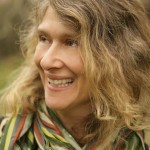
Podcast: Play in new window | Download
Aharon Appelfeld: Blooms of Darkness
May 15, 2010 by David
Filed under Fiction, WritersCast
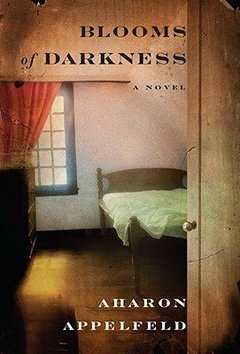 978-0805242805 – Shocken Books – Hardcover – $25.95
978-0805242805 – Shocken Books – Hardcover – $25.95
Aharon Appelfeld’s Blooms of Darkness is a powerful, majestic and triumphant coming of age novel. It’s told entirely in the first person, in sentences that are short, sharp, clear and beautifully composed. And since we know that it was written originally in Hebrew, the translator, Jeffrey M. Green, deserves special mention for the excellent English version we have here.
The book takes place in an unnamed city in Ukraine from 1943 to the end of the war, not even three years. The narrator and central character is Hugo, 11 years old at the outset of the novel, taken by his mother to stay with her closest friend Mariana, who turns out to be a prostitute living in a brothel. Much of the novel, therefore, takes place in the closet and room they share, under constant threat of exposure and death. The sense of living in a highly charged atmosphere, in such an internal space, is almost palpably claustrophobic, and inhabits every element of the story. The relationship between Hugo and Mariana is the core of the novel; they each suffer, they depend entirely upon each other. Their relationship grows and deepens through the course of the novel and its experience becomes a powerful transformative force for Hugo, who, like the author, survives the war as a completely different person than he was when his story begins.
Aharon Appelfeld has lived in Jerusalem for more than sixty years. He speaks many languages, but now writes only in Hebrew, which he learned only as an adult. We talked in depth about the events and characters in this beautiful novel, the nature of fiction as opposed to memoir, and about the author’s life as a Holocaust survivor and Jewish writer and teacher. Blooms of Darkness is a novel that has stayed with me since I read it; its story is one of hope and survival, as is the life of its author. This novel was transformative for me, as was my discussion with its brilliant author.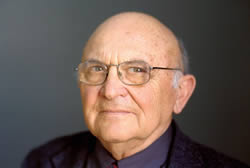
Podcast: Play in new window | Download
